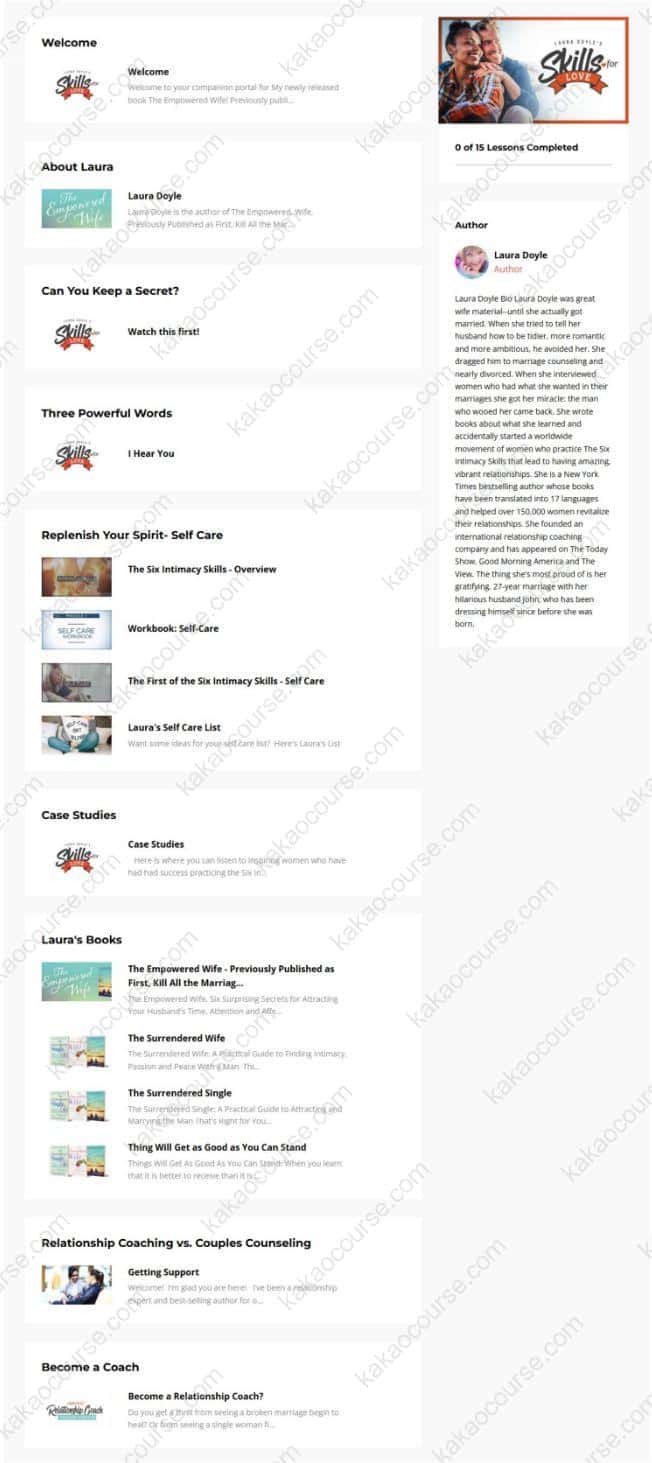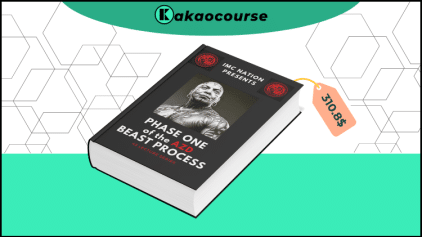Immediately Download Skills for Love by Laura Doyle
Check proof of content, now:
Skills for Love by Laura Doyle, see what’s included in this course:
Skills for Love by Laura Doyle, Free Download PDF Sample Below:
The In-depth Review of This Course – Skills for Love by Laura Doyle
Skills for Love by Laura Doyle is a structured, practice-first program designed to translate the author’s well-known “Six Intimacy Skills” into daily, repeatable behaviors that foster emotional safety, mutual respect, and renewed attraction. Built around an accessible learning portal, the curriculum blends concise videos (“Watch this first!”, “Three Powerful Words,” “I Hear You”), guided worksheets (e.g., Workbook: Self-Care), curated resources (Laura’s Self Care List), and real-world Case Studies from women who have implemented the skills in marriages and long-term partnerships. The tone is academic yet actionable: each concept is broken down into plain-language principles, exemplars, and micro-practices so you can test and observe results in your real relationships.
At the heart of the program is the Six Intimacy Skills – Overview, followed by a close-up on the first skill—Self-Care—as a foundational lever for change. Rather than attempting to “fix” a partner, learners are coached to lead with personal responsibility, emotional regulation, and value-aligned communication. This approach aligns naturally with long-tail search intent such as “evidence-based communication frameworks for wives,” “how to practice feminine receptivity without losing boundaries,” and “relationship self-care routine to restore intimacy.” The course also situates the skills within Laura Doyle’s broader work (e.g., The Empowered Wife, The Surrendered Wife, The Surrendered Single), while remaining focused on skill acquisition rather than theory alone.
The Welcome and About Laura sections frame expectations and origin stories for the method. Learners get a clear roadmap, a companion portal to reinforce reading, and optional pathways for Getting Support (e.g., community and coaching) and professional growth (the Become a Coach track). The result is a coherent, human-first curriculum: minimal jargon, strong structure, and a steady rhythm of learn → practice → reflect.
Why Should You Choose This Course?
Skill-based, not personality-based. The program centers on behaviors anyone can learn—self-care rituals, gracious communication, respectful requests, gratitude practices—rather than unchangeable traits. This makes the material replicable and measurable, aligning with “behavioral frameworks for improving marital satisfaction.”
A gentle, agency-forward philosophy. Rather than diagnosing your partner, Skills for Love turns the spotlight inward: how you regulate, speak, and receive. By restoring personal equilibrium first, you create conditions where closeness can grow. This resonates with “how to rebuild intimacy without controlling a spouse.”
Real cases and real scripts. The Case Studies library translates abstract concepts into lived experience. Short video vignettes and stories show how micro-shifts—brief self-care breaks, appreciation statements, or a single respectful request—can de-escalate conflict and increase connection. Think “relationship improvement case studies with practical examples.”
A modular, low-friction learning portal. Lessons are brief and layered—ideal for busy professionals or parents. You can watch a 5–10 minute segment (e.g., “Three Powerful Words”), try one experiment the same day, and log results. This matches “bite-sized relationship coaching exercises for busy wives.”
Support that meets your level. The portal includes Getting Support for additional coaching and Become a Coach for advanced learners who wish to professionalize. This scaffolding supports the long-tail query “relationship coaching vs couples counseling—what works for behavior change?”
Grounded in self-care as the first lever. Many learners discover that resentment and reactivity fade when daily self-care is non-negotiable. Establishing a Self-Care “baseline” improves tone, patience, and playfulness—inputs that reliably predict better outcomes. This directly answers “how to use self-care to improve marriage communication.”
What You’ll Learn
The Six Intimacy Skills—A working model.
You will gain a high-level map of the Six Intimacy Skills, with particular emphasis on Self-Care as the keystone habit. Even without memorizing all six at once, you’ll learn how a single, consistent practice can lead to measurable changes—improved tone, reduced criticism, and re-opened channels of warmth. (Long-tail keyword: Six Intimacy Skills step-by-step for beginners.)
Self-Care—From concept to daily practice.
In The First of the Six Intimacy Skills – Self Care, you’ll turn theory into routines: short restoration breaks, sensory “reset” rituals, and a customized menu using Laura’s Self Care List. You’ll track before/after mood, then connect those gains to higher-quality conversations. (Long-tail: daily self-care plan to reduce marital conflict.)
“Three Powerful Words” & “I Hear You”—Micro-scripts for emotional safety.
Two brief lessons sharpen empathic listening and succinct acknowledgment. You’ll practice replacing rebuttals and advice with validation and curiosity—without abandoning boundaries. (Long-tail: best acknowledgment phrases for relationship repair.)
Respectful requests & gratitude loops.
Even small wording changes shift outcomes. You’ll learn how to make clear, respectful requests that preserve dignity and invite cooperation, then reinforce wins with specific gratitude. (Long-tail: how to make respectful requests that increase intimacy.)
Replenish Your Spirit—Self regulation under pressure.
“Replenish Your Spirit” integrates breath, body, and schedule design: when you’re depleted, you can’t connect. You’ll build a personal “recovery stack” (e.g., sunlight walk, music, journaling, hydration) to use before high-stakes conversations. (Long-tail: emotional regulation routine for wives during conflict.)
Case Studies—From theory to evidence-in-action.
Real examples show how the Six Intimacy Skills reframe criticisms, cool defensiveness, and restore playfulness. You’ll extract patterns that match your context, turning stories into templates. (Long-tail: relationship transformation case studies using the Six Intimacy Skills.)
Companion readings—Context and continuity.
Excerpts and summaries from The Empowered Wife and other titles provide conceptual continuity and frequently asked questions, such as handling stonewalling, navigating apologies, and discerning needs vs. demands. (Long-tail: how The Empowered Wife complements online training.)
Pathways to support—Coaching vs. counseling.
The Relationship Coaching vs. Couples Counseling section outlines when skills coaching (behavioral, present-focused) may serve better than diagnosis-oriented therapy, and when to seek specialized clinical support. (Long-tail: relationship coaching vs couples counseling which is right.)
Professional track—Become a Coach.
For those moved to formalize practice, the Become a Coach module outlines ethos, scope, and client outcomes so you can evaluate the pathway. (Long-tail: how to become a relationship coach using the Six Intimacy Skills.)
Who Should Take This Course?
Spouses seeking a reset without ultimatums.
If you want to improve connection but dread rehashing old grievances, you’ll appreciate skills that focus on present-moment behavior and positive reinforcement. (Long-tail: how to rebuild intimacy without rehashing the past.)
Busy professionals and parents with limited bandwidth.
Lessons are short and stackable; you can implement one tool per day and still see compounding benefits over weeks. (Long-tail: five-minute relationship exercises for busy couples.)
Readers of The Empowered Wife who want a companion portal.
The course provides videos, worksheets, and scripts to operationalize what you read, answering the common question: “What do I do first, second, third?” (Long-tail: companion course for The Empowered Wife.)
Individuals who prefer practical coaching to abstract advice.
If you want scripts, checklists, and measurable wins, the portal’s structure will fit your style. (Long-tail: practical relationship coaching with scripts and worksheets.)
Aspiring relationship coaches.
If you already help friends or community members informally, the Become a Coach path shows how to turn skill proficiency into ethical, client-centered practice. (Long-tail: relationship coach certification based on intimacy skills.)
Implementation Roadmap (A Sample 21-Day Plan)
Days 1–3: Orientation & Baseline
-
Watch Welcome and “Watch this first!”
-
Complete a quick baseline: rate connection (0–10), conflict frequency, and personal energy.
-
Read The Six Intimacy Skills – Overview. Choose one daily self-care action from Laura’s Self Care List (10–20 minutes).
Days 4–7: Self-Care → Tone Shift
-
Work through Workbook: Self-Care; schedule two micro-restorations per day (e.g., stretch + tea).
-
Journal changes in tone and patience; note one conversation that felt easier.
Days 8–11: Listening & Validation
-
Study Three Powerful Words and I Hear You.
-
Replace rebuttals with one acknowledgment per conversation (“I hear that you’re stressed about X.”).
-
Track outcomes: reduced escalation, more willingness to collaborate.
Days 12–15: Respectful Requests & Gratitude
-
Practice one respectful request daily (“I would love…”) and close loops with a gratitude statement.
-
Observe compliance and mood shifts; refine wording for clarity and respect.
Days 16–18: Case Studies & Calibration
-
Watch Case Studies; extract two patterns relevant to your home.
-
Run a small experiment (e.g., pre-conversation self-care + validation + request + gratitude).
Days 19–21: Consolidation & Next Steps
-
Revisit metrics (connection, conflict, energy) and compare to baseline.
-
Decide on a sustainable weekly rhythm (two self-care blocks + one gratitude practice + one new request).
-
If you need structured accountability, explore Getting Support; if you feel called, review Become a Coach for long-term development.
Best Practices for Sustainable Results
-
Consistency over intensity. Small, daily reps beat weekend marathons. Even a five-minute restoration can change the temperature of a conversation. (Long-tail: micro-habits for marital satisfaction.)
-
Lead with self-care. When your nervous system is regulated, curiosity returns and criticism declines—opening space for humor, warmth, and attraction. (Long-tail: self-care routine to reduce marital resentment.)
-
Acknowledge before asking. Validation lowers defenses and makes requests land as invitations rather than commands. (Long-tail: acknowledgment phrases that build intimacy.)
-
Be specific and gracious. Vague requests yield vague results. Clear, respectful language plus timely gratitude creates a virtuous loop. (Long-tail: respectful request templates for wives.)
-
Track lightly, iterate often. Use minimal metrics (connection 0–10, weekly conflict count, daily energy) to see patterns and refine. (Long-tail: relationship progress tracker simple template.)
-
Stay within your lane. You can change your part of the dance—tone, timing, requests, gratitude—without micromanaging your partner. (Long-tail: how to improve marriage without controlling spouse.)
Conclusion
Skills for Love by Laura Doyle provides a rigorous yet accessible framework for restoring emotional safety, respect, and playfulness in committed relationships. Through concise video lessons, practical worksheets, curated self-care menus, and evidence-in-action case studies, learners build competence in the Six Intimacy Skills—starting with daily Self-Care as the keystone habit. The program’s micro-practices are designed for real life: brief enough to implement today, structured enough to measure, and humane enough to sustain. Whether you are seeking a gentle reset, translating insights from The Empowered Wife into action, or evaluating the path toward relationship coaching, this curriculum delivers a clear, academically toned, SEO-friendly roadmap from intention to behavior to results.
Call to Action
Start today—choose one self-care action, practice one acknowledgment, and make one respectful request to set a new tone of connection.












Reviews
There are no reviews yet.